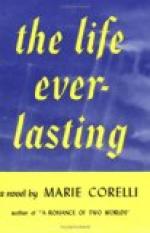Now the spirit of a little child is receptive and trustful. It has no desire for argument, and it is instinctively confident that it will not be led into unnecessary difficulty or danger by its responsible guardians. This is the spirit in which, if we are sincere in our seeking for knowledge, we should and must approach the deeper psychological mysteries of Nature. But as long as we interpose the darkness of personal doubt and prejudice between ourselves and the Light Eternal no progress can be made,—and every attempt to penetrate into the Holy of Holies will be met and thrust back by that ‘flaming Sword’ which from the beginning, as now, turns every way to guard the Tree of Life.
Knowing this, and seeing that Self was the stumbling-block with most of my correspondents, I was anxious to write another book at once, also in the guise of a romance, to serve as a little lamp of love whereby my readers might haply discover the real character of the obstacle which blocked their way to an intelligent Soul-advancement. But the publisher I had at the time (the late Mr. George Bentley) assured me that if I wrote another ‘spiritualistic’ book, I should lose the public hearing I had just gained. I do not know why he had formed this opinion, but as he was a kindly personal friend, and took a keen interest in my career, never handing any manuscript of mine over to his ‘reader,’ but always reading it himself, I felt it incumbent upon me, as a young beginner, to accept the advice which I knew could only be given with the very best intentions towards me. To please him, therefore, and to please the particular public to which he had introduced me, I wrote something entirely different,—a melodramatic tale entitled: “Vendetta: The Story of One Forgotten.” The book made a certain stir, and Mr. Bentley next begged me to try ‘a love-story, pur et simple’ (I quote from his own letter). The result was my novel of “Thelma,” which achieved a great popular success and still remains a favourite work with a large majority of readers. I then considered myself free to move once more upon the lines which my study of psychic forces had convinced me were of pre-eminent importance. And moved by a strong conviction that men and women are hindered from attaining their full heritage of life by the obstinate interposition of their merely material Selves, I wrote “Ardath: The Story of a Dead Self.” The plan of this book was partially suggested by the following passages from the Second Apocryphal Book of Esdras:—
“Go into a field of flowers where no house is builded. And pray unto the Highest continually, then will I come and talk with thee. So I went my way into the field which is called Ardath, like as he commanded me, and there I sat among the flowers.”
In this field the Prophet sees the vision of a woman.
“And it came to pass while I was talking with her, behold her face upon a sudden shined exceedingly and her countenance glistened, so that I was afraid of her and mused what it might be. And I looked, and behold the woman appeared unto me no more, but there was a city builded, and a large place showed itself from the foundations.”




